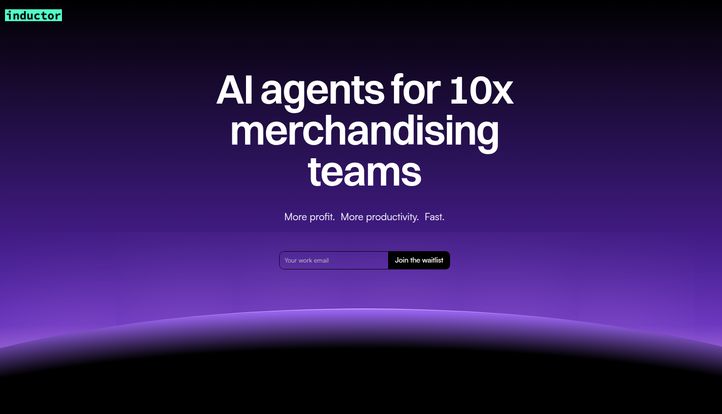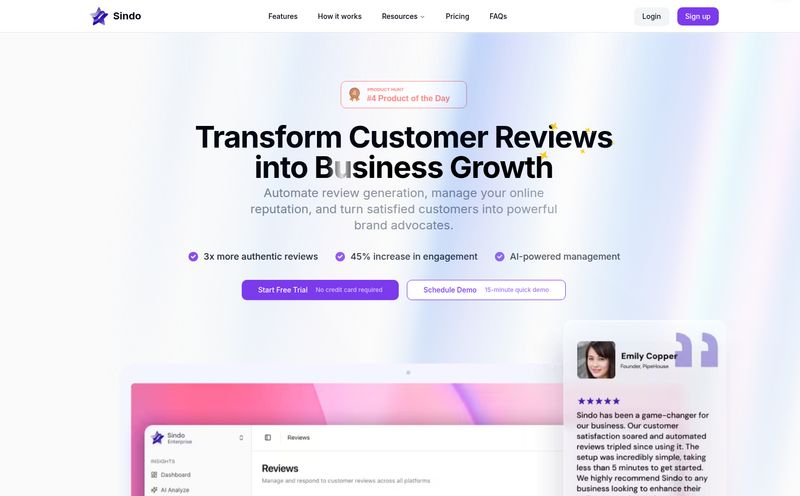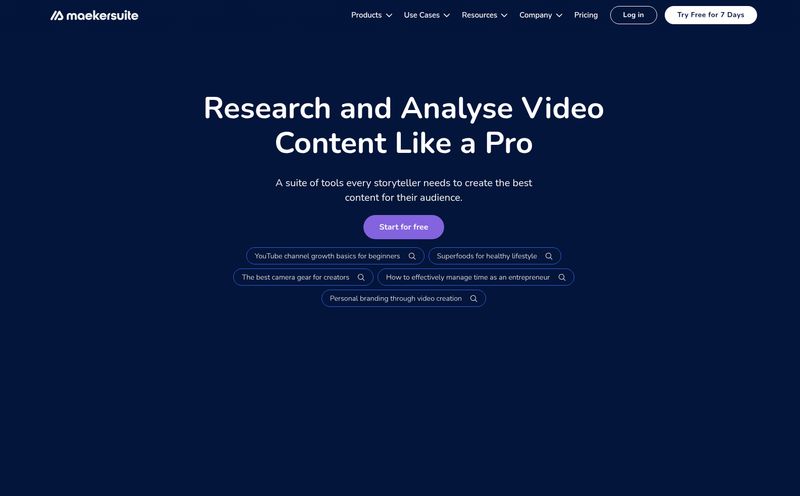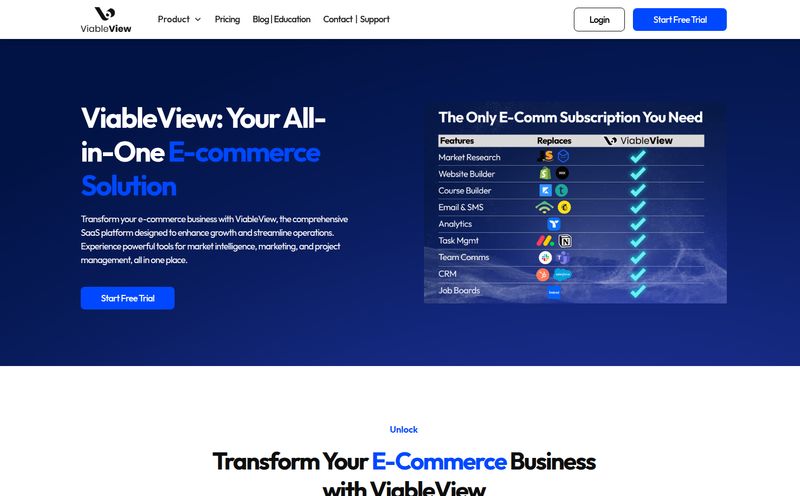I’ve been in the SEO and traffic game for a long time. Long enough to remember when “Panda” was just a cute bear and not a career-ending algorithm update. I’ve seen trends come and go, from the keyword-stuffing dark ages to the current obsession with E-E-A-T. But every once in a while, something pops up on my radar that makes me lean in a little closer. This week, that something is called Inductor.
I stumbled upon their landing page, and it hit me with one of those big, bold, almost audacious claims:
AI agents for 10x merchandising teams.
Ten. X. That’s a bold number. In a world where a 10% lift is cause for celebration, 10x is a promise of a revolution. The page is slick, all dark mode and futuristic purple glows. It’s mysterious. It’s intriguing. And it’s guarded by the modern-day velvet rope of tech startups: a waitlist.
So, What Exactly is Inductor Hiding Behind that Waitlist?
After a bit of digging, the picture gets clearer, and frankly, more interesting. Inductor isn’t just another AI chatbot you plug into your storefront to answer “where’s my order?” for the thousandth time. It’s positioned as a serious developer tool with two distinct, but deeply connected, purposes.
Think of it like building a high-performance race car. You don't just need a world-class driver; you need an impeccable engineering team ensuring every part of the engine is tuned to perfection. Inductor aims to be both the engineering team and the driver.
On one hand, it's a tool for developers to evaluate and improve the quality of their LLM (Large Language Model) applications. This is the nitty-gritty, under-the-hood work. On the other hand, it provides the end product of that work: highly effective AI agents specifically built for commerce.

Visit Inductor
The Two Sides of the Inductor Coin
Let's break that down, because this dual-focus is what I think makes it stand out from the crowd.
For the Devs: An LLM Quality Control Inspector
Anyone who's worked on deploying AI knows the principle of "garbage in, garbage out." If your language model is poorly trained or drifts in performance once it's live, your fancy AI tool becomes... well, not so intelligent. I’ve seen it happen. A chatbot that confidently gives completely wrong information is worse than no chatbot at all. It erodes trust. Inductor seems to address this head-on by providing tools to vet LLM applications during development and monitor them in a live production environment. This is huge. It’s the difference between hoping your AI works and knowing it does.
For the Marketers: Your New AI Merchandising Team
This is the part that connects to that sexy "10x" promise. Once you have a high-quality, reliable LLM, what do you do with it? Inductor unleashes it in the form of AI agents for commerce. These aren't just for customer service. The goal here is to directly impact ecommerce KPIs – increase sales and decrease costs. Imagine AI agents that can analyze trends in real-time, optimize product sorting for maximum conversion, or even suggest dynamic pricing strategies based on competitor moves and customer behavior. This moves a merchandising team from being reactive—poring over last week's sales reports—to being frighteningly proactive.
Why This Could Genuinely Shake Up Ecommerce
For years, ecommerce has been a game of A/B testing and educated guesses. We set up campaigns, test landing pages, tweak product descriptions, and then wait for the data to tell us if we were right. It’s effective, but it's slow. The potential here is to have an always-on, learning-and-adapting layer to your merchandising strategy.
If the LLM quality assurance part works as advertised, it means you can trust the AI agents' outputs. A finely-tuned AI merchandiser could theoretically run thousands of micro-experiments a day, constantly optimizing the customer experience in a way a human team just physically can't. That’s how you get to a 10x in productivity. Not by replacing your team, but by giving them a tool that can execute and analyze at an inhuman scale.
Okay, Let's Pump the Brakes: The Hype vs. The Hurdles
I’m an optimist, but I’m also a realist. As exciting as this sounds, we're still looking at a very polished landing page and not much else. There are some definite question marks here.
First, there's the information vacuum. The site is beautiful but sparse on the nitty-gritty details. What specific evaluation metrics does it use for LLMs? What kind of autonomy do these AI agents have? These are the questions a Head of Ecommerce or a lead dev will need answered. While I was poking around, some of the links on their site even led me to a “Page Not Found” error, which suggests things are still very much under construction. It adds to the mystery, but also signals that it's probably very early days.
Then there's the exclusivity of the waitlist. Is it there because demand is through the roof, or because the product isn't ready for primetime? It’s a classic marketing move to build hype, but it also means we can't get our hands on it to see if the performance matches the promise. I’ve signed up, of course. For science.
Finally, a small but important point for us data-privacy folks. The brief mentions reliance on cookies for analysis. This is standard practice, of course, but in a world growing more conscious of data privacy (thanks, GDPR and Apple), the implementation will matter. Transparency here will be critical for gaining user trust.
And the Million-Dollar Question: What's the Price?
Unsurprisingly, there’s no pricing page. This is typical for a product in a pre-launch or waitlist phase. My guess? It won't be cheap. A tool promising to 10x your merchandising team isn't going to be a $49/month Shopify plugin. I’d expect a tiered pricing model, probably aimed at mid-market to enterprise-level ecomerce businesses. Think SaaS pricing that scales with usage, revenue, or the number of AI agents deployed. But for now, your guess is as good as mine.
Who Should Be Smashing that 'Join the Waitlist' Button?
Based on its positioning, Inductor isn't for the solo entrepreneur just starting out. It seems custom-built for established ecommerce businesses that have an in-house or agency development team. You need the technical chops to appreciate the LLM quality aspect and the scale of business to truly benefit from the AI merchandising agents. If you're a CTO, a Head of Ecommerce, or a digital strategist at a brand that's serious about leveraging AI beyond the surface level, you should probably get on that list.
My Final Take: Cautiously Excited
Look, the AI space is noisy right now. There’s a new “game-changing” tool launching every single day. Most of them are fluff. But Inductor feels a bit different. By tackling the foundational problem of LLM quality first, they're building on a solid base. It shows a deep understanding of the actual problem, not just the flashy outcome.
Will it really 10x merchandising teams? The jury is out. But does it have the potential to be a supremely powerful tool for a specific type of user? Absolutely. For now, it’s a beautifully designed promise. I, for one, am eager to see if they can deliver. Joining the waitlist costs nothing but an email address, and in this industry, staying ahead of the curve is priceless.
Frequently Asked Questions
- What is Inductor AI?
- Inductor is a developer-focused platform that offers tools to evaluate and ensure the quality of Large Language Model (LLM) applications. It also provides specialized AI agents designed to improve merchandising, increase sales, and boost productivity for ecommerce businesses.
- How does Inductor help ecommerce businesses?
- It aims to help by providing AI-powered merchandising agents that can handle tasks like product optimization, trend analysis, and potentially dynamic pricing. The goal is to improve key ecommerce metrics, increase team productivity, and drive higher profits.
- Is Inductor available to use now?
- Currently, Inductor is not publicly available. Access is managed through a waitlist, which you can join on their official website. This suggests the product is in a beta or pre-launch phase.
- What is an LLM application?
- An LLM (Large Language Model) application is any software or tool that uses a large language model, like GPT, as its core engine. This includes advanced chatbots, content generators, and analytical tools like the AI agents Inductor offers.
- How much does Inductor cost?
- There is no public pricing information available at this time. This is common for tools in a waitlist phase. Pricing will likely be revealed closer to a public launch and may be aimed at mid-to-enterprise level businesses.
- Are there any privacy concerns with Inductor?
- Like many web analytics and optimization tools, Inductor may rely on cookies to analyze traffic and user behavior. While a standard industry practice, businesses should always be aware of the data privacy implications and ensure compliance with regulations like GDPR.



